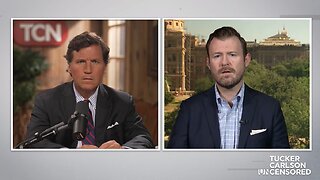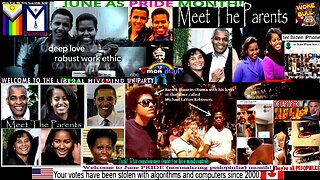Tucker Carlson Uncensored: People Are Waking Up Here’s the bright side of a dark time:
people are starting to notice the lies. The vibe is changing fast.
Tucker Carlson Uncensored: People Are Waking Up Here’s the bright side of a dark time people are starting to notice the lies. The vibe is changing fast.
TRANSCRIPT
Tucker [00:00:00] The news is so grim at this point, you almost don't want to turn on your phone in the morning. It's just piece after unremitting piece, suggesting that Western civilization is crumbling and collapsing all around us. Followed by typically a summary piece confirming that in fact it is collapsing all around us. So it is against that grim landscape that we read a piece the other day that was just the opposite. It was hopeful and smart and beautifully expressed in. A couple of people sent it to us. It was written by a man called Santiago Pliego, and it's written on a Substack, and the piece is called The Vibe Shift. And the thesis essentially, is that people are starting to notice that things are a mess. And the main thing that's amiss is the gap between the reality that they observe and the version of reality presented them by the government, the media, the experts. And this is good. It is long overdue that people are starting to see glimpses of reality. Here's a paragraph from the piece that kind of sums up the idea very nicely. And we're quoting, "The vibe shift I'm talking about is the speaking of previously unspeakable truths, the noticing of previously suppressed facts. I'm talking about the feel you get when the walls of propaganda and bureaucracy start to move as you push. The very visible dust kicked up in the air as experts and fact checkers scramble to hold on to decaying institutions. The cautious but electric rush of energy when dictatorial edifices designed to stifle innovation, enterprise and thought are exposed or toppled." As we said, so nicely expressed, beautifully written. Santiago Pliego is the venture director at New Founding, and we're honored to have him join us now. Santiago, thank you for joining us. Thank you for writing this piece, which absolutely made my morning. And it really was the one, the one bright spot in my, news consumption last week. Why did you write this piece? What moved you to do it?
Santiago Pliego [00:02:02] Sure. Thanks for having me. Why I wrote it is because I think, a lot of people are noticing the life shift, and I'd been kind of keeping tabs on it with my friends and my colleagues for, you know, let's say nine months or so, a little bit over that, but especially in the last nine months. Not a day goes by that we don't have a conversation where or see something online, or read a piece or see a crossover of people that we would have never expected to see kind of together. And that that would have been sort of inconceivable five years ago, even a year and a half ago. And, my friends and I sort of started file this way in a mental folder called The Life Shift. And I think a lot of people are sensing that things are changing. Sure, the stakes are high and getting higher. I think the pressure will continue to come. And we'll not relent. But that's cost a lot of people, especially young people, young guys especially, to kind of wake up and decide that they're not going to go along with this anymore, that the world is built and designed in a certain way, and that they're ready to return to reality.
Tucker [00:03:11] You said that people are coming together in unexpected ways. I see that in my own life as I send warm text to Naomi Wolf, who I love. I never thought I'd be doing that in this lifetime. But tell us what you mean when you say that.
Santiago Pliego [00:03:27] Yeah. So there are there's a pressure that is applied equally to groups of people, regardless of sort of the camp or the community you might be a part of. If you are a normal family and you just want to send your kids to a school where they won't get fed, you know, ideology, or if you're building AI tools and want them to be regulated, or if you just want to, be able to speak your mind, or if you want to be able to vote, without interference or whatever, all of those people, are now facing the same pressure to kind of decelerate, stagnate, to ossify into a bureaucratic monolith. And so I think these groups what's interesting about that, but one of the interesting things about the vibe shift is that all of these groups that we're, usually not used to working together or seeing each other as co belligerents in a cultural fight are finding each other and are saying, hey, you have useful things that that we can use over here, and we have useful things and task ideas that you can use over here. And that's creating, again, this pressure, this monolithic pressure, bureaucratic pressure top down across a variety of different groups and circles, whether you're in Silicon Valley or just a normal American family or in the Midwest or in you, doesn't matter. Everybody is facing this kind of existential pressure, and that's causing a lot of these groups to look for co belligerents to look for allies. And that's creating really interesting crossovers, people that you would not think, would be working together or reading each other or boosting each other's content or, or interacting with one another are all of a sudden coming together in ways that, that are exciting.
Tucker [00:05:09] So that does seem like the threat. I mean, if if I'm the head bureaucrat trying to create this new system of mediocrity and stagnation with myself at the top really is its sole beneficiary. The last thing I want is for the people I've worked so hard to divide, to find each other and unite against me. So what do I mean? Like, what's the response going to be?
Santiago Pliego [00:05:32] I think the response is going to be increased pressure in some ways. But and this is why I talk about this in the piece, an important part of the life shift, maybe not its sole cause, but certainly an important piece of the enabling of the live shift was, was Elon Musk buying Twitter and turning it into X? There was it's hard to overstate without kind of signing up sounding hyperbolic, but, these groups that I'm talking about, disparate groups that are now finding themselves working together, where by design, algorithmically or otherwise unable to find each other, even, you know, as early as 18 months ago, and you couldn't you couldn't talk online, you couldn't find other people who thought like you or even wanted to ask the same questions, as you. And it made very it made it very difficult, very isolating to, to, a very sort of isolating dynamic from people to, to be online and to find co belligerence and others who share their, their mind, their values. I think that pressure will continue to escalate. But Elon has kind of taken an important piece of the puzzle, of the bureaucrats puzzle out completely topple that sort of Jenga tower and enabled for a new dynamic online for people to interact and meet each other in ways that that really does threaten that that monolithic power structure.
Tucker [00:06:55] So you make it sound so simple, and maybe it is. So all you needed to do as an individual was to notice the distance between what they were telling you and what was clearly true, and then you just needed a place to talk to other people who'd notice the same thing.
Santiago Pliego [00:07:10] There is something simple about it. Yes. I think it's precisely because so simple that there was so much pressure exerted on, certainly Twitter, but other tools that are still under the regime control. And I think it's, it's why Musk coming in, gutting 90% of X and restoring it kind of in, in, in a path towards truth and, and a free speech that. A relatively simple act. It was not a simple act. It was a takeover, but a relatively simple, singular act. Unlocks a mass amount of opportunity across, communities, across people to communicate, interact and organize again in ways that were just not allowed 18 months ago, algorithmically, policy wise or, for a variety of different other ways.
Tucker [00:08:04] Well, and speaking of noticing things, why did you notice this or decide to focus on it when a lot of other notices out there are wholly focused on the downside and on the destruction of the civilization, etc.? But you saw you saw light instead of darkness. What, how and why?
Santiago Pliego [00:08:23] The how and whys. This is my job. This is what we do, a new founding. So we, help the builders that want to build a positive alternative vision for the country. These are, people who are building new companies, new institutions who want to work with each other, who want to, got kind of craft a new path forward. And we realize that. Yes, as you as you said in the opening monologue, things are bleak, things are dark. Increasingly pressure grows. But we needed a positive vision. And people are drawn to a positive vision. It's important to know the stakes of the game. It's important to know, that, that things are challenging and difficult. But people are drawn and rally around a positive vision. And I started to notice this. My job as an investor backing, different people and companies. I started to notice that young guys in particular were done pretending. They were done pretending with, kind of the lies of liberal modernity. And they were crafting, or charting a different course. These young guys in particular, building cool companies that we wanted to invest in or we were interacting with, like, by virtue of the circles that I, that I'm in, startups and such. But there was something very distinct about this new kind of founder. If you, you know, your listeners or you if I say, imagine a startup founder in 2000, in the 2010s and Silicon Valley, what do you think of, you know, a geeky guy maybe weighs 150 pounds who was building some kind of productivity tool. He lives in the sort of neutral world where he doesn't want to rock the boat building. He thinks it's a political, an apolitical endeavor. And he wants to keep his head down because he wants to go public at some point and make, you know, hundreds of millions of dollars. So why why rock the boat, right? That's not the world we live in anymore. And young guys, the young guys I'm seeing building very interesting companies, building incredible technologies, building new institutions. Our guys who are explicitly pro-america, explicitly pro-family, values Christian religious. They're the opposite, the antithesis of the again, the sort of picture of the 20 tens startup Silicon Valley founder. And that that caught my eye. I said, why is this happening? Why is it that these young guys are making, are taking very big swings their companies are building are also not just productivity software or something to make your HR overlords more productive. They're building very difficult companies, companies that, there's a friend of mine who, name is Augustus. He's building a company called Rainmaker. He sends drones up to the clouds, and he's seeding clouds in California and other places where it doesn't usually rain to make it rain where it doesn't. And, you know, we think, oh, the drought, the drought in California can't be fixed. It's just that it's just there to stay. And Augustus is thinking, no, it's not there to stay. Why can't we just will it differently? Why can we just disrupt that, world? He's a young guy. He's a Christian. He has a particular vision about the world, that he is excited to build and willing to existence. And so by virtue of spending time with these guys and, my, my job is to kind of pay attention to to where the builders are going, I started to notice. And what it gives me hope is that I think, again, as the pressure increases, as the bureaucracy gets worse, as die and east, you know, all this nonsense grows. The best people of our generation, like those who are the most competent, the most courageous, the most ready to build, are ready to opt out of those monolithic systems and build a different future, a positive, exciting future. And those are the people that I'm paying attention, and those are the people that I want to help.
Tucker [00:12:13] So it sounds like you're in a good mood most days.
Santiago Pliego [00:12:16] Yes, definitely in a good mood. And don't get me wrong, I know, I know how it is out there, but as I say in the piece, the vibe shift is, looking at the world around us, refusing to take the black pill and choosing to build instead. That's a that's an important piece of the life shift. And yes, it puts me in a good mood when I when I see other guys building. Great. You know, positive things.
Tucker [00:12:39] Amazing. I mean, I have to say, we're talking off air. I'm on the more anti-technology Ted Kaczynski wing of things. But it was the technology that allowed me to read this. And I think you were saying you put this up on a Substack with no subscribers.
Santiago Pliego [00:12:54] No subscribers? Yeah, I pitched it to another, publication, and they didn't have the bandwidth to run it. So I built a I literally just put open a new Substack, hit publish. I spent a couple of hours writing this piece. I didn't want it to go to waste. And then, you know, let it sit for, for a bit, and then, you reached out.
Tucker [00:13:14] Amazing, amazing.
Santiago Pliego [00:13:15] But yes, the point here with technology and how I see it being useful again, generally, I, I'm cautious. I'm, I'm very excited about technology. But I do think there's a moral component. I don't see technology or building companies as an apolitical or neutral endeavor. I think there's nothing more political than building a large company or a disruptive technology, but especially in times like this, where institutions that I mean, think about this way, Harvard has been around for, what, almost 400 years? Google, almost a $2 trillion market cap, both seemingly institutions that are here to stay permanently forever. They're never going away. Right. And yet, in the last few months, Harvard has been toppling and shaking. What's with the cladding and all the all the great work that Chris Rufo did and then Google Gemini or Google with with the recent shenanigans with Google Gemini, these again, seemingly permanent, unmovable sort of institutions are now up for grabs and the spaces they dominate, I think, are up for grabs over the next decade, if not sooner. And so the right guys, building the right companies, the right guys, building the right institutions, the right ambitious, excellent, institutions grounded in reality. The right technologies can really disrupt. There's a once in a lifetime opportunity now to disrupt the status quo. I think of technology as a non coercive lever. It's about building the future. You have a vision of the future that you want to willing to existence. You get a bunch of guys together, you raise some capital and you say, let's build a different, better future. And right now there are categories, critical categories in our society that are up for grabs. And we want the right guys, to build and disrupt those.
Tucker [00:15:04] Amazing. Well, thank you for reminding us of that, particularly those of us with dark Scandinavian souls that not all is lost and that God's at work too. And good things happen as well as bad. And the future is not settled. So thank you. And your piece did all of that for me. Thanks.
Santiago Pliego [00:15:20] Absolutely. Thank you for it. And great to meet you.
-
 36:41
36:41
crashingthunder
30 days agoTucker Carlson Uncensored: A Post-Christian America w author John Daniel Davidson
4101 -
 40:00
40:00
MyCatholicRedPill
1 year agoTucker Carlson Tonight,02/03/2023
290 -
 40:13
40:13
MyCatholicRedPill
1 year agoTucker Carlson Tonight | 04-10-2023
6784 -
 2:38
2:38
DeVeRneY
9 months agoTUCKER CARLSON💜✨INTERVIEWS WHISTLEBLOWER EXPOSING BIDENS CRIMES🎬🎙️🧩💫
3875 -
 40:13
40:13
MyCatholicRedPill
1 year agoTucker Carlson Tonight, Weeknights 8PM EST -1/23/23
281 -
 3:46
3:46
MyCatholicRedPill
8 months agoTucker Carlson: "In 2008 it became really clear that Barack Obama had been having sex with men
4.61K3 -
 1:31:50
1:31:50
Truths Unlimited
5 months agoTUCKER ON X : EPISODE 46 - ALEX JONES | TUCKER CARLSON (Dec 7, 2023)
10.2K6 -
 23:19
23:19
EXPOSE the PEDOS end of the CABAL
21 days agoTucker Carlson - Exposing the Dark Side of Amazon What’s it like to work for Jeff Bezos?
8.21K14 -
 8:47
8:47
VeteransAgainstTreason
3 months agoTucker Carlson On Illegal Aliens
537 -
 3:00
3:00
DeVeRneY
1 year agoTUCKER CARLSON💜🏅EXPOSED BILL GATES CLIMATE CHANGE AGENDA☣️💨✈️🌥️
1.63K6